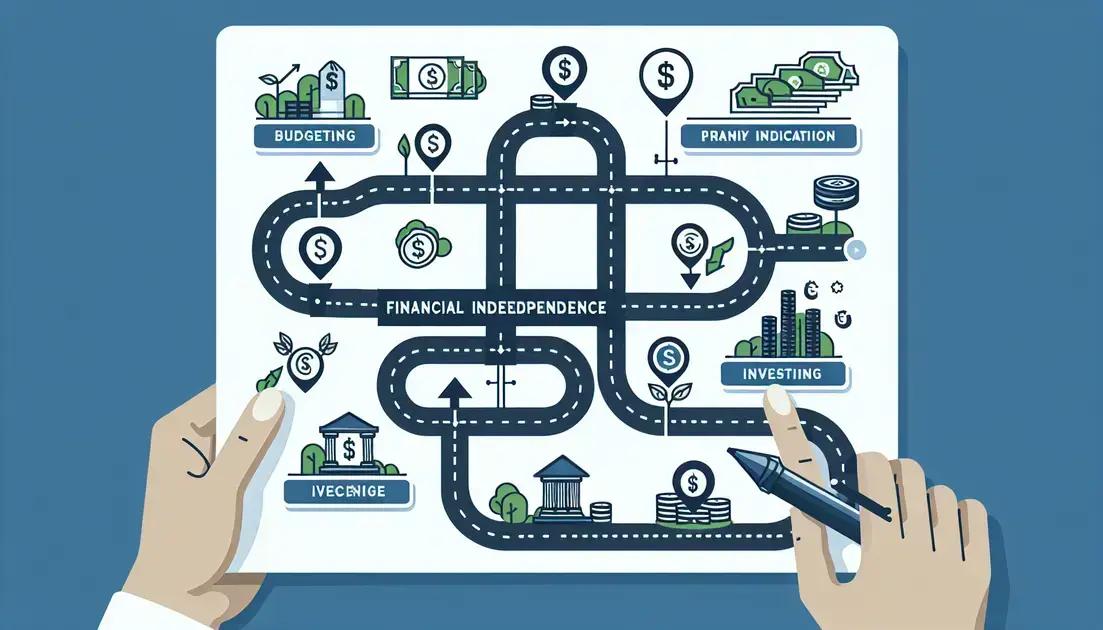Unlocking Your Path to Wealth and Freedom
Advertising
Financial Independence is a term that refers to the state where an individual has enough personal wealth to live without having to actively work for basic necessities. It means having the freedom to decide how to use your time without being constrained by financial responsibilities.
Key Components of Financial Independence
To achieve financial independence, it’s essential to understand its core components, which include:
- Income: Generating sufficient income through various sources, including investments, business ventures, or passive income streams.
- Savings: Setting aside a portion of your income consistently to build a financial safety net and invest for future needs.
- Investing: Growing your wealth by investing in assets such as stocks, real estate, or other profitable ventures.
- Budgeting: Managing your expenses wisely, ensuring you live within your means while also allocating funds for savings and investments.
The Importance of a Mindset Shift
Achieving financial independence requires a change in mindset. You need to view money not just as a means to an end but as a tool to achieve freedom. Being financially independent allows you to pursue passions, travel, or retire early without stress.
How Long Does It Take?
The time it takes to reach financial independence varies greatly among individuals and depends on factors like income level, lifestyle choices, and investment strategies. Setting clear goals and benchmarks will help you track your progress toward this life-changing milestone.
Overall, financial independence is more than just accumulating wealth; it’s about creating a lifestyle that affords you the freedom to enjoy life on your own terms.
Steps to Achieve Financial Independence Early

To achieve financial independence early, follow these crucial steps that lay the groundwork for a secure financial future:
1. Set Clear Goals
Start by defining what financial independence means to you. Set specific, measurable goals that you want to achieve in a certain timeframe. This could include saving a specific amount, starting a business, or investing in properties.
2. Create a Budget
A well-crafted budget helps you track your income and expenses. Aim to spend less than you earn. Allocate funds for savings, investments, and daily needs. Regularly review your budget to ensure you are on track.
3. Build an Emergency Fund
Having an emergency fund is essential for financial security. Aim to save at least three to six months’ worth of living expenses. This fund will provide a safety net, allowing you to focus on reaching your financial independence goals without unnecessary stress.
4. Invest Early and Often
Start investing as soon as possible, even if it’s a small amount. Compound interest can significantly grow your wealth over time. Consider stocks, bonds, and mutual funds as part of your investment strategy.
5. Live Below Your Means
Adopt a lifestyle that prioritizes savings over spending. This doesn’t mean sacrificing enjoyment; instead, focus on smart spending. Find joy in experiences rather than material possessions.
6. Educate Yourself
Knowledge is power. Read books and attend workshops on personal finance and investing. The more you know, the better decisions you can make on your journey toward financial independence.
7. Seek Passive Income Opportunities
Explore ways to create passive income streams. This might include rental properties, dividends from stocks, or side businesses that do not require considerable time investment.
By taking these steps, you can pave the way to financial independence much earlier in life. Each step builds upon the last, creating a solid foundation for a prosperous future.
Common Mistakes on the Path to Financial Independence
On your journey toward financial independence, it’s easy to make some common mistakes that can hinder your progress. Avoiding these pitfalls will help you stay on track:
1. Underestimating Expenses
Many people forget to account for all their living expenses. Whether it’s groceries, utilities, or occasional medical costs, not budgeting for these can lead to financial strain. Always have a clear understanding of your monthly bills.
2. Failing to Save Early
Delaying savings can be detrimental. The sooner you start saving and investing, the more your money can grow through compound interest. Make saving a priority from the beginning.
3. Ignoring Debt
Carrying high-interest debt can severely affect your journey to financial independence. Focus on paying off debts, especially credit cards, as they can accumulate quickly and eat into your savings.
4. Living Beyond Your Means
It’s easy to fall into the trap of lifestyle inflation. As your income increases, avoid the temptation to spend more on luxuries. Stick to your budget and prioritize savings and investments.
5. Lack of Financial Education
Failing to educate yourself on financial matters can lead to poor decisions. Invest time in learning about budgeting, investing, and financial planning. This knowledge is essential for making informed choices.
6. Not Having a Clear Plan
Without a solid plan, it’s easy to get lost. Define your financial goals and create a timeline for achieving them. This will help you stay focused and motivated on your path to financial independence.
7. Relying Too Much on One Income Source
Diversifying your income sources can provide financial security. Relying on only one job can be risky. Consider side hustles or investments that generate passive income.
By being aware of these common mistakes and actively working to avoid them, you can navigate your journey toward financial independence with greater ease and success.
Tools and Resources for Financial Independence

On your journey to achieving financial independence, several tools and resources can help you along the way. Here are some essential ones you should consider:
1. Personal Finance Apps
Using personal finance apps like Mint or YNAB (You Need A Budget) can help you track your income, expenses, and savings goals. These tools offer budgeting features that make it easy to monitor your financial health from your smartphone.
2. Investing Platforms
Investing is key to growing your wealth. Platforms like Robinhood, E*TRADE, or Betterment allow you to trade stocks or invest in ETFs and mutual funds. Many offer educational resources to help beginners understand investing strategies.
3. Online Courses and Webinars
Numerous online platforms like Coursera, Udemy, or Khan Academy provide courses on personal finance, investing, and financial planning. Learning from experts can enhance your knowledge and empower your financial decisions.
4. Financial Blogs and Podcasts
There are many blogs and podcasts focused on financial independence. Resources like Mr. Money Mustache or The Mad Fientist offer insights, tips, and inspiring stories to help motivate you on your journey.
5. Books on Financial Literacy
Reading books such as “Rich Dad Poor Dad” by Robert Kiyosaki and “The Total Money Makeover” by Dave Ramsey can offer valuable frameworks for building wealth and managing your finances more effectively.
6. Supportive Communities
Joining communities like Financial Independence and Retiring Early (FIRE) forums can provide encouragement and share strategies. Engaging with like-minded individuals can keep you motivated and accountable.
7. Financial Consultants
If you feel overwhelmed, consider consulting a financial advisor. Professional guidance can help tailor a plan to reach your financial independence goals based on your unique circumstances.
Utilizing these tools and resources can significantly enhance your path toward financial independence, giving you the support and knowledge needed to thrive financially.
Achieving Financial Independence: The Path Forward
In conclusion, the journey to financial independence is one filled with strategic planning, informed decisions, and diligent effort. By understanding the concept, setting clear goals, and using the right tools and resources, you can set yourself on a path to success.
Avoiding common pitfalls such as underestimating expenses and failing to educate yourself is crucial. Remember that every step you take, from budgeting wisely to seeking advice, brings you closer to your financial dreams.
Financial independence isn’t just a destination; it’s a lifestyle choice that grants you the freedom to live life on your terms. Embrace each aspect of the journey, and let it empower you to create a prosperous future.




